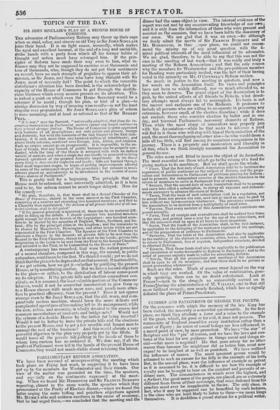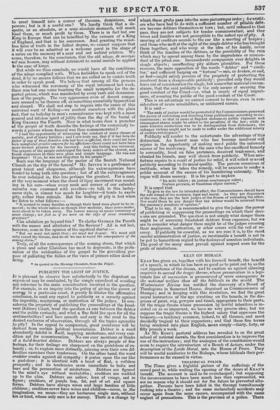CENSORS AND PANEGYRISTS OF GEORGE THE FOURTH.
OF the censures with which the memory of the late King has been visited, the necessity is somewhat questionable. In the first place, we think they attribute a force and a value to the example of the great, which, for good or for evil, it does not possess. The community of Fegland resembles every institution rather than a "court of Equity ; no union of social beings are less influenced; in a moral point of view, by mere precedent. We have "the star" of Scripture and the " pix" of reason, and we have the laws and cus- toms of the land for our guidance in things moral and things so- cial—what more is required? He that goes astray for no other reason than because his neighbour did so before him, must now expect to be laughed at as well as punished. We have outlived the influence of names. The most ignorant grooin would be ashamed to seek an excuse for his folly in the example of his lord. But, in the second place, were the influence of example as potent as it. is assumed to be, it is difficult to see how the example of royalty can be brought to bear on the conduct and pursuits of or- dinary men. The circumstances in which even the highest, and a fortiori, the great mass of the people, are placed, are so extremely different from those Of their sovereign, that ruses deduced from his practice must ever be inapplicable to theirs. The only class, in fact, who it may be supposed can be benefited by such lectures, is the class who are least likely to listen to them—we mean kings themselves. It is doubtless a proud station for a political writer, to erect himself into a censor of thrones, &minions, and powers ; but is it a uSeful'one? We hardly think that a de- spotic, or an absolute, or a• semi- absolute monarch, will much heed them, or much profit by them. There is in fact but one King in Europe that can be benefited by the censure of a King of England, and that is his successor. And granting the resist- less force of truth in the fullest degree, we cannot suppose that it will ever he an admitted or a welcome guest in the shape of a satire on the memory of a near and not unkind. relation. We come, therefore, to the conclusion, that the old adage, de mortuts oil nisi bonum, may without detriment to social morals be applied to the case of kings. But while we thus conclude, we would have all the conditions of the adage complied with. When forbidden to speak evil of the dead, it by no means follows that we are called on to violate truth in order to speak good. We believe that among all the persons who witnessed the ceremony of the royal. interment last week, there was but one voice touching the small sympathy for the de- parted prince, which was manifested by every rank and denomina- tion of the people. The very appearance even of decent compo- sure seemed to be thrown off, as something essentially hypocritical and absurd. We shall not stop to inquire into the cause of this universal want of feeling—we content ourselves with the plain fact, that no holyday in man's remembrance was kept with a more general and intense spirit of jollity than the day of the burial of King GEORGE the Fourth. Now in what terms does a preacher of the gospel of truth describe the feelings of the community to- wards a person whose funeral was thus commemorated? " I had the opportunity of witnessing the conduct of many classes of society, and of many families ; and I can truly say, that if it had been the father of any of these families who had been so afflicted, there could not have been manifested greater concern for his affliction—there could not have been more fervent prayers for his recovery. And this feeling was universal. The prayers of the people outstripped the tardy orders of the church, and found expression in their own plain and simple language. He was not forgotten ! 0 no, he was not forgotten by his people!" Such was the language of the pastor of the Scotch National Church on the day of the funeral.* Mr. Iavisia is a gentleman of great talent and eloquence, although his extravagancies have tended to bring both into question ; but of all the extravagancies he ever indulged in, this was perhaps the greatest. For a man, at the very moment when the shout of tipsy merriment was, sound- ing in his ears—when every nook and corner of our extended suburbs was crammed with revellers—to talk in this lachry- mose style, is almost too much for laughter—it tends to excite pity, rather than ridicule. But the feeling of pity is lost when we listen to what follows :- " It seemed to many families as though their head were about to be re- moved ; to the whole nation as though their mediator, their peace-maker, were about to be taken away. The lowest among us seems conscious of some change ; we feel as if we were on the edge of some crumbling precipice." Can adulation go beyond this? To clothe GEORGE the Fourth with the names and attributes of the Saviour ! All is not lost, however, even in the opinion of the mystical doctor:— " But we must not speak thus ; we must not despair. We must still rally round the throne, and do all we can to resist the consequences of the cumin; storm."
Truly, of all the consequences of the coining storm, that which a pious and sober Christian has most to deprecate, is the praa- nation of the sublinaities of the gospel to the grovelling pur- pose of palliating the follies or the vices of princes either dead or living.
• As quoted in the Morning Chronicle, from the Pulpit.



























 Previous page
Previous page